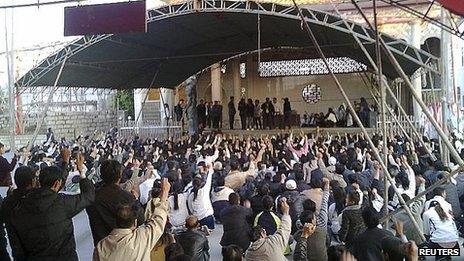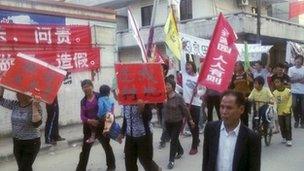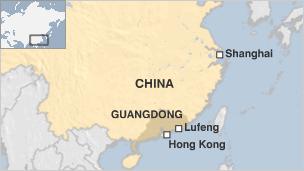China protest worsens in Guangdong after villager death
- Published

New protests flared after the death of the village representative in custody
A stand-off between villagers and the authorities is continuing in southern China's Guangdong province.
Police have blocked roads leading to the village of Wukan. Local people are trying to keep them out.
The row - over village land taken by the local government - has been simmering for some time.
A new wave of protests broke out several days ago after the death of a villager while in police custody.
It is not easy to get information about what is going on in the area. One local official denied there was a problem.
But it appears that villagers have held a series of protest rallies over recent days involving hundreds of people.
A video of one demonstration, posted online, shows angry protesters shouting slogans such as "Down with corrupt officials".
"We will continue our fight until the end," one man told the BBC.
'Guarding the village'
The row with the authorities has deep roots. Villagers say local officials have over a long period taken their land and not given them proper compensation.
In a show of anger, they staged protests - and went on a rampage - in September.
In that protest they tore down a wall that had been built around land earmarked for development and ransacked government offices.
This latest unrest was sparked by the detention and death of villager Xue Jinbo, who was acting as a village representative.
The government detained him, with a group of others, last week, saying he was a criminal suspect being held in relation to the September protests.
But on Monday the authorities announced that he had died of a "sudden illness" on the third day of his detention.
The Lufeng city government, which oversees Wukan, said he had been rushed to hospital but doctors could not save him.
In a statement it said he had died after developing heart problems and "other causes had already been provisionally ruled out".
An official report into the death dismissed suggestions that Mr Xue had been "beaten to death by police", according to China's state-run Xinhua news agency.
Examiners apparently found "no serious wounds" on the body apart from a few bruises on his wrists and knees.
"We assume handcuffs left the marks on his wrists and his knees were bruised slightly when he knelt," said an expert involved in preparing the report.

Conflict over land is not unusual in the Chinese countryside
But villagers still are questioning the cause of death - and want the body returned, which they say the local government is refusing to do.
"There is no written law to say he cannot be returned home," said a villager surnamed Gao, the dead man's son in law.
He said the protesters would not back down
"The villagers have been guarding the village and stopping the police from coming inside," he said.
Zheng Yanxiong, a local communist party chief, made an appeal for the protests to end in a Xinhua article.
"The government will strive to settle all related problems and hopes that the village will not be instigated into staging further riots," he said.

Conflict like this over land is not unusual in the Chinese countryside.
There are thought to be tens of thousands of what the government refers to as mass incidents every year.
But this row seems larger and more intense than many others. Local people have shown they are willing to take on the authorities.
- Published12 December 2011
- Published25 September 2011
- Published23 September 2011
- Published14 June 2011
- Published5 March 2011